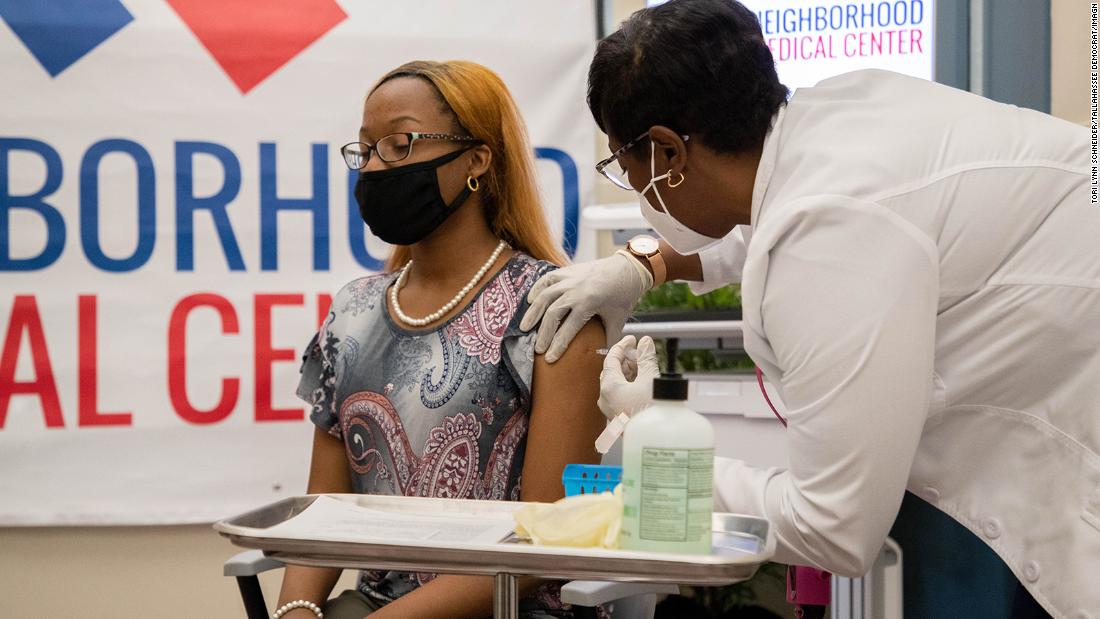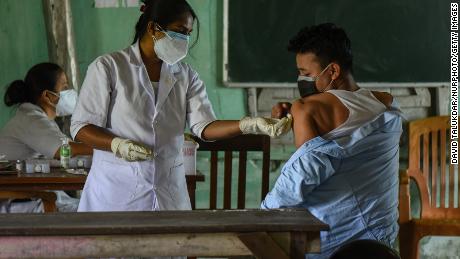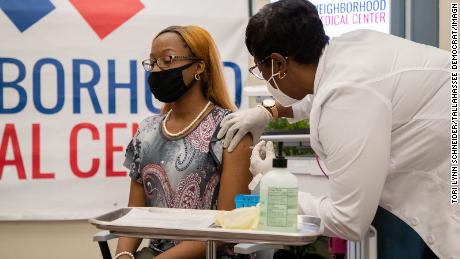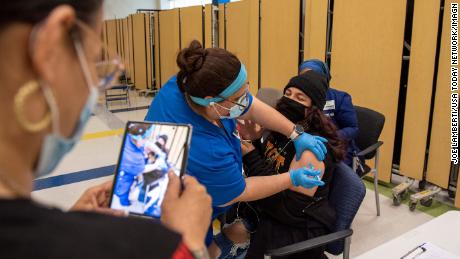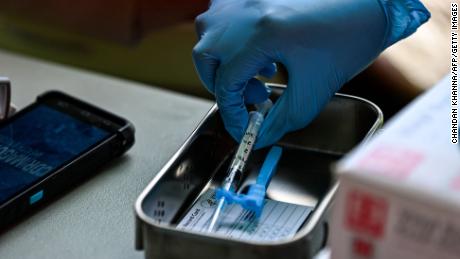Dangerous Covid variants could set back national progress against the pandemic, officials warn
Nationwide, 64% of adults have received at least one dose of the Covid-19 vaccine and about 54% are fully vaccinated, yet the Biden administration’s goal of having 70% of adults with at least one dose of vaccine by July 4 will fall short at the current pace.
More than a dozen states have hit that goal as of this week, according to the CDC.
“This kind of doubting the safety of vaccines, doubting the necessity of vaccines … it is very, very dangerous, and a lot of people are hearing this,” CNN medical analyst Dr. Jonathan Reiner said.
“New variants will continue to emerge as the pandemic persists,” researchers said, noting there has been no evidence that variants have largely escaped such vaccine protections.
“Therefore, increasing the proportion of the population immunized with current safe and effective authorized vaccines remains a key strategy to minimize the emergence of new variants and end the Covid-19 pandemic.”
California and other states to loosen restrictions
With California set to fully reopen in four days, the state will drop its stay-at-home order, is revising health directives and will begin to roll back most pandemic related-executive orders, according to Gov. Gavin Newsom.
A new health order will go into effect Tuesday, allowing for vaccinated individuals to go without a face covering in most situations. Masks will still be required on public transportation and indoors in hospitals and jails.
Schools and child care centers will still require face coverings, pending updated guidance from the Centers for Disease Control and Prevention.
“California is turning the page on this pandemic, thanks to swift action by the state and the work of Californians who followed public health guidelines and got vaccinated to protect themselves and their communities,” Newsom said.
The state will stop limiting capacity and enforcing physical distancing at venues, and the color-coded tier system for regions will be retired, a release from the governor’s office stated.
Public health measures will remain only for events with 5,000 or more people indoors or 10,000 attendees outdoors. Vaccine verification will be required or at least recommended, according to a revised health order set for Tuesday.
Other states and cities this week lessened Covid-19 restrictions in light of improving news.
Maine’s state of civil emergency will end June 30, according to an announcement from Gov. Janet Mills’ office on Friday.
The state’s last remaining mask requirement, which only applies to indoor pre-K to grade 12 schools and child care settings, also will go away at the end of the month. But health officials still urge anyone who is not vaccinated to wear a mask indoors.
Philadelphia on Friday ended its indoor mask mandate as well as 11 p.m. last calls for restaurants, according to a release from the city.
“For nearly fifteen months, the City of Philadelphia has had restrictions in place to protect each other, and I have no doubt that these restrictions saved countless lives,” Mayor Jim Kenney said. “But Friday will be a day that we’ve all been looking forward to: getting back to doing the things that we love. Thanks to the more than two-thirds of adults who’ve been vaccinated already, we can finally do the things that we’ve missed doing for the last year.”
In New Hampshire, the state’s coronavirus state-of-emergency will expire Friday night and Gov. Chris Sununu has said he would not be renewing it. A public health incident status will remain in place, Sununu said, allowing healthcare providers and the New Hampshire Department of Health and Human Services to coordinate further Covid-19 efforts.
“It’s about vaccination,” Sununu said at a briefing on Thursday. “We have a very high rate of vaccination with both our healthcare staff and the residents themselves, which is great and we’re going to keep encouraging that.”
FDA discussion over vaccinating children continues
One member of a panel of FDA vaccine advisers spoke out strongly against extending emergency use authorization to coronavirus vaccines for children under the age of 12, saying more safety data is needed.
“Before we start vaccinating millions of adolescents and children, it’s important to find out what the consequences are,” said Dr. Cody Meissner, director of pediatric infectious diseases at Tufts University School of Medicine, who advocated for more extensive testing.
“We need a vaccine for adolescents and children,” Meissner told CNN. “But I think we also want to be sure that the benefit exceeds the risk.”
Meissner also praised the success of vaccinations so far against the pandemic, saying, “These vaccines are equivalent to our accomplishments in space.”
FDA adviser Dr. Paul Offit told CNN’s Wolf Blitzer that he was “confident that there was unanimity” among advisers on the importance of having a Covid-19 vaccine for children despite disagreement over how potential vaccines are researched and authorized.
“I certainly think we would have a vaccine by early next year, and hopefully we’ll have a vaccine for the 6-to-12-year-old by the end of the year,” Offit said.
“If we’re past the pandemic — if this is all behind us — then that’s not going to be an issue, but we’re not past the pandemic,” Offit added. “The variants are still out there and becoming more contagious. I think when the winter comes, you’re going to see this virus surge again, so we still need a vaccine.”
CNN’s Deidre McPhillips, Maggie Fox, Lauren Mascarenhas, Cheri Mossburg, Artemis Moshtaghian and Rebekah Riess contributed to this report.
![]()


